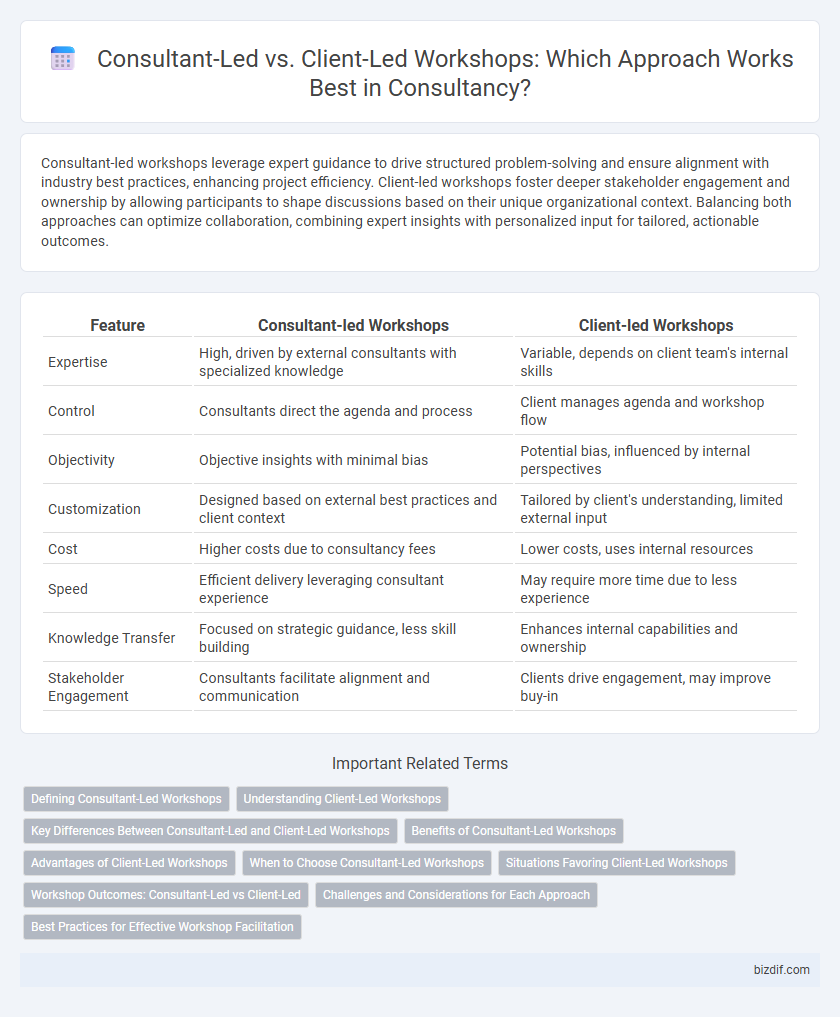Consultant-led workshops leverage expert guidance to drive structured problem-solving and ensure alignment with industry best practices, enhancing project efficiency. Client-led workshops foster deeper stakeholder engagement and ownership by allowing participants to shape discussions based on their unique organizational context. Balancing both approaches can optimize collaboration, combining expert insights with personalized input for tailored, actionable outcomes.
Table of Comparison
| Feature | Consultant-led Workshops | Client-led Workshops |
|---|---|---|
| Expertise | High, driven by external consultants with specialized knowledge | Variable, depends on client team's internal skills |
| Control | Consultants direct the agenda and process | Client manages agenda and workshop flow |
| Objectivity | Objective insights with minimal bias | Potential bias, influenced by internal perspectives |
| Customization | Designed based on external best practices and client context | Tailored by client's understanding, limited external input |
| Cost | Higher costs due to consultancy fees | Lower costs, uses internal resources |
| Speed | Efficient delivery leveraging consultant experience | May require more time due to less experience |
| Knowledge Transfer | Focused on strategic guidance, less skill building | Enhances internal capabilities and ownership |
| Stakeholder Engagement | Consultants facilitate alignment and communication | Clients drive engagement, may improve buy-in |
Defining Consultant-Led Workshops
Consultant-led workshops are structured sessions where industry experts guide discussions, leveraging their specialized knowledge to address complex challenges and drive strategic decision-making. These workshops focus on collaborative problem-solving, with consultants facilitating frameworks and methodologies tailored to the client's needs. This approach ensures actionable insights, aligns stakeholder objectives, and accelerates project outcomes through expert-led guidance.
Understanding Client-Led Workshops
Client-led workshops prioritize the client's agenda, fostering active participation and deeper insights tailored to their unique challenges and goals. This approach enhances stakeholder engagement and ensures outcomes are directly aligned with organizational needs, promoting ownership and smoother implementation of strategies. Effective facilitation skills are essential to guide discussions, manage group dynamics, and keep the workshop focused on delivering actionable results specific to the client's context.
Key Differences Between Consultant-Led and Client-Led Workshops
Consultant-led workshops prioritize expert guidance, structured frameworks, and leveraging industry best practices to drive outcomes efficiently, ensuring alignment with strategic goals. Client-led workshops emphasize internal knowledge, stakeholder perspectives, and organizational context, fostering ownership and tailored solutions that reflect company culture. Key differences include facilitation style, decision-making authority, and the balance between external expertise versus internal insights.
Benefits of Consultant-Led Workshops
Consultant-led workshops deliver expert-driven insights and structured frameworks that accelerate decision-making and problem-solving. These sessions leverage the consultant's specialized knowledge and industry experience to tailor solutions that align with best practices and strategic goals. Clients gain clarity and actionable outcomes, minimizing ambiguity and enhancing overall project alignment and success.
Advantages of Client-Led Workshops
Client-led workshops empower stakeholders to drive the agenda, ensuring discussions are closely aligned with organizational priorities and challenges. This approach fosters greater engagement and ownership from participants, promoting actionable insights tailored to the client's unique context. Enhanced collaboration in client-led settings often leads to faster decision-making and more sustainable implementation of solutions.
When to Choose Consultant-Led Workshops
Consultant-led workshops are ideal when specialized expertise and structured problem-solving are required to address complex organizational challenges or implement industry best practices. These workshops leverage the consultant's in-depth knowledge and experience to drive strategic alignment, facilitate unbiased decision-making, and accelerate project milestones. Opt for consultant-led sessions when clients seek objective guidance, rigorous analysis, and tailored solutions that internal teams may lack the capacity or perspective to develop independently.
Situations Favoring Client-Led Workshops
Client-led workshops are highly effective when the client possesses specialized knowledge and seeks active involvement in decision-making processes. These workshops foster greater ownership, ensuring solutions align closely with the client's operational realities and strategic goals. Situations requiring rapid consensus or customized approaches benefit significantly from client-led facilitation, enhancing engagement and commitment to outcomes.
Workshop Outcomes: Consultant-Led vs Client-Led
Consultant-led workshops typically deliver structured, expert-driven outcomes with clear strategic alignment and actionable recommendations, leveraging the consultant's specialized knowledge and experience. Client-led workshops often foster higher stakeholder engagement and ownership of outcomes, enabling tailored solutions that reflect internal insights and organizational culture. Balancing consultant expertise with client participation enhances workshop effectiveness by combining data-driven guidance with practical, context-specific implementation.
Challenges and Considerations for Each Approach
Consultant-led workshops often face challenges such as maintaining participant engagement and aligning expertise with client needs, requiring careful facilitation and agenda structuring to ensure actionable outcomes. Client-led workshops demand strong internal leadership and clear communication channels, with the risk of insufficient external insights potentially limiting strategic direction. Both approaches necessitate balancing control and collaboration while addressing resource allocation, stakeholder involvement, and desired decision-making speed to optimize workshop effectiveness.
Best Practices for Effective Workshop Facilitation
Consultant-led workshops prioritize expert guidance, structured agendas, and targeted methodologies that drive clear outcomes, leveraging the consultant's specialized knowledge and facilitation skills. Client-led workshops emphasize internal ownership, fostering team engagement, and aligning workshop content closely with organizational culture and context to enhance relevance and buy-in. Combining clear objective-setting, active participation techniques, and tailored facilitation approaches optimizes workshop effectiveness regardless of leadership style.
Consultant-led workshops vs Client-led workshops Infographic

 bizdif.com
bizdif.com